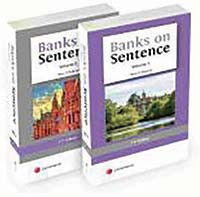
- Author: Harry O’Sullivan
- Publisher: LexisNexis Butterworths
- ISBN: 9781474323017
- RRP: £159.99
Banks on Sentence is now in its 17th edition and in many respects, this publication deserves a tremendous amount of credit for being right at the start, and perhaps the impetus for, the present wealth of quality texts dedicated to ‘sentencing’ as a standalone discipline.
Over the last two decades, the sentencing exercise in criminal courts has, for better or worse, become a technical and somewhat formulaic application. Gone now are the days when experienced criminal judges can use common sense and experience to pass individual sentences which not only fit the crime, but fit the perpetrator of that crime.
The Sentencing Guidelines Council, as it was once called, began the infiltration of the judge’s role and very soon, ‘guidelines’ became mathematical formulas, which require analysis and application, with the occasional input of case law to remind us that the sentencing process remains in the legal rather than mathematical department.
Sentencing is all about consistency and predictability. It is to be made user friendly, capable of broadcast on television and rigorous enough to survive a ‘red top’ battering.
Enter Banks and all the sons and daughters of Banks.
Divided into two soft back volumes (for those of us who take our law from things we can touch, feel and smell), the first volume tackles the fundamental tools of sentencing from Bind Overs to Serious Terrorism Sentencing, introduced in 2021, the latter providing a most accessible resume of the regime and its application to different age groups.
Banks grapples with the latest developments of sentencing in the context of terrorism related offences with the confidence of a publication which others have since followed. The recognition that sentencing in this modern and dangerous world not only means quantification of time ‘inside’ but also addressing future arrangements for release and monitoring, is expertly nuanced in this latest work. Volume 2 is, as the author informs us, substantially rewritten to take in these important changes, which of course makes the text right up to date.
The easily referenced volumes make for swift and accurate access to the materials, and the criminal offence by criminal offence structure adds to a logical approach to this wide ranging subject. As always, the close proximity of the case law to the starting points, aggravating and mitigating factors, make a full assimilation of all the tools at the advocates disposal both clear and condensed.
As was eloquently put by the Chair of the Commission into the Experience of Victims and Long-Term Prisoners in the preface to that report: ‘It is not just the length of the sentence but the content of the sentence that fulfils the requirements of the judge’s direction for retribution, reduction of crime, deterrence, public protection, reparation and rehabilitation’. Banks goes a long way to helping the courts achieve this difficult but vital balance.
Or as one of my clients once put it when I met him in prison to discuss tariffs: ‘What does Banks say, Mr Cooper?’
Reviewer: Professor John Cooper KC, 25 Bedford Row (www.25bedfordrow.com).










